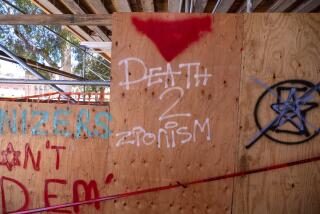Islam and Politics
- Share via
* Milton Viorst’s column, “A Witch Hunt in the Name of Allah” (Commentary, July 19), is so filled with ill-defined terms, misstatements of fact and distortions about Islam it is hard to know where to begin in reply. Viorst throws around the usual terms, such as “fundamentalist,” “fanatic” and “extremist,” often used by those in opposition to Islamic participation in political decision-making.
I am sure that if pressed, Viorst would have a hard time defining these terms without defining practicing Muslims. That lack of definition is at the heart of most attacks on Islam. Pundits such as Viorst divide the Islamic world into two camps. “Moderate” Muslims are those who shut up, accept the wholesale Westernization of their societies, and acquiesce to the perpetual authoritarian rule of Western-oriented regimes. The “fundamentalist” Muslims are those who speak out against this process and try to do something about it. Since peaceful dissent of the type Americans take for granted is largely banned in these areas, a frustrated and misguided minority of Muslim activists react with un-Islamic acts of violence, giving writers like Viorst more ammunition for their smear campaigns.
Viorst and his fellow alarmists also like to claim that “fundamentalist” Muslims are only using religion as a path to political power. They say this as if there were any Muslim scholars or thinkers throughout the 14 centuries since the Prophet Mohammed (peace be upon him) who advised separating Islamic principles and morality from politics.
Until the rise of repressive post-colonial regimes, even the most corrupt rulers of Muslim peoples did not advocate this separation. It was only with the power and support of the Western and former Eastern blocs that this division began to take place. Those groups and individuals who adopted some form of foreign ideology were promoted as proxies in the Muslim world. Those who wished to hold on to their cultural and religious traditions were suppressed.
The Islamic reawakening’s aim is not, as Viorst claims, “to stifle any challenge to orthodoxy, any loosening of the cultural status quo.” Instead, committed Muslims, who have witnessed the tragic consequences of secularism, communism and materialism in Muslim lands, seek to re-establish a society based on the unchanging Islamic values of justice, equality and mutual consultation.
The issue of Islam’s supposed hostility to democracy is also a favorite of writers like Viorst who claim Islamists will “suppress democracy as soon as they take over.” In fact, when Muslim groups have been given the chance to take part in multi-party politics in places like Jordan, Pakistan, Malaysia, Yemen and Turkey, they proved to be able campaigners who accept the outcome of elections. It is only when Islam is locked out of the political system that problems occur.
IBRAHIM HOOPER
Communications Director
Council on American-Islamic Relations
Washington
More to Read
Sign up for Essential California
The most important California stories and recommendations in your inbox every morning.
You may occasionally receive promotional content from the Los Angeles Times.










